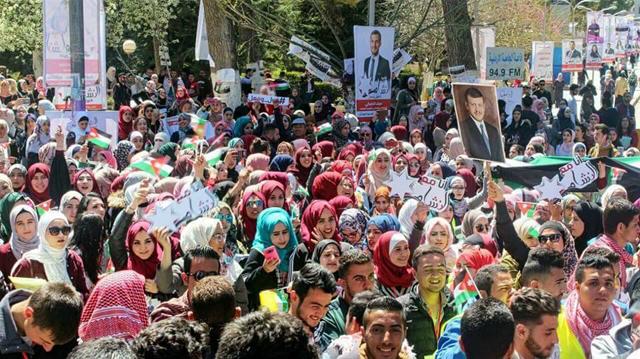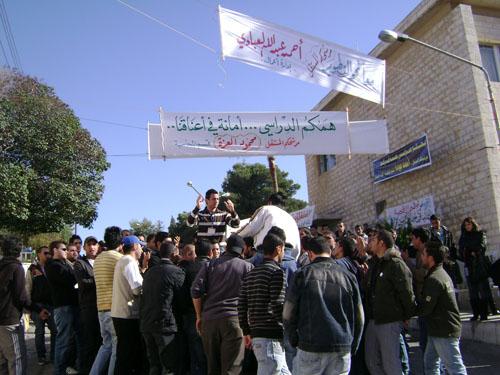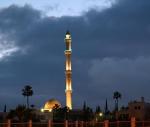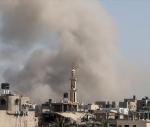You are here
UJ takes to polls to choose student council representatives
By Maram Kayed - Apr 20,2019 - Last updated at Apr 20,2019
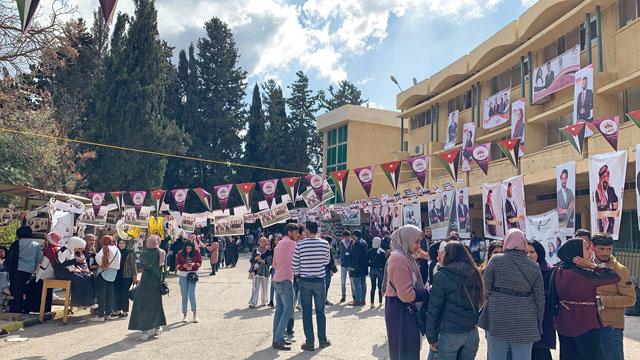
University of Jordan students line up at the polls to vote for their student council representatives, on Thursday. The many banners and posters seen in the background caused some students to allege outside funding (Photo by Maram Kayed)
AMMAN — Thousands of students at the University of Jordan voted to elect their student council on Thursday, sifting through more than 700 candidates.
The results were announced late on Thursday night, with Ahl al-Hemmeh, the Islamist-directed slate, winning six out of 12 seats university wide.
With an estimated 6,750 votes, Ahl al-Hemmeh was closely followed by Al Nashama, the self-proclaimed tribes’ representative, which also won six seats with around 5,930 votes.
The election process was monitored by the university’s election committee and by Raqeb, an independent student organisation.
Yamen Khleif, Raqeb’s spokesperson, said the election went smoothly “for the most part, but some events were suspicious and may or may not have affected the outcome”.
“The elections ran smooth up until the ending, when the voting was extended for an additional hour at the very last minute. People were also permitted to vote with their citizen IDs rather than their university IDs, which was dubious. We have asked the university, who does this every year, specifically not to allow that,” he added.
The voting process was initially supposed to end at 4pm, but was extended at the last minute to 5pm. Some claimed that people had brought their non-student relatives or friends to vote.
On their Facebook page, Ahl al-Hemmeh posted a video of young men jumping the university’s fence at around 4:25pm.The video was captioned: “Once again, irregularities at the last minute raise suspicions. The surprising turnout at the last hour means some were already aware that this would happen.”
“We were reassured that this would not be allowed again, but it was,” said Layan Asha, a member of Ahl al-Hemmeh and former student council member.
However, the university’s security said that all of the university’s gates were closed, with only the electronic gates open so that only those with a university ID were allowed to enter. University security added that after 5pm the electronic gates only allowed people to exit using their IDs and people were not allowed to enter.
All gates were also heavily monitored by police cars, security said.
“We like to increase security because we have had some years where things got violent,” said Abu Saher Karajeh, a security guard who works at the northern gate.
“I parked my car near the main gate and went to have lunch at the northern gate, but when I came back at 5:45pm the security would not let me in,” confirmed Sarah Rezeq, a university student.
However, the Raqeb group said that some gates were “lax”, and people were let in without a university ID.
The two parties that followed Ahl al-Hemmeh and Al Nashama won three seats each. Al Awdeh, which defines itself as a representative of the Palestinian electoral, and Al Karameh, another tribe-oriented slate, gained around 2,810 votes each.
Al Tajdeed, which adopts a mixed communist and socialist ideology, won no seats. Last year, it gained won one seat for the first time.
The 88 faculty-level seats were won by a mix of university slates and other independent groups.
The election recorded a 45 per cent turnout, with some students saying they were turned off by political pandering. “Some promote tribalism, some use religion to get ahead and some use people’s emotions towards Palestine. I think all of that is wrong,” said Esraa Salameh, an engineering student.
Other students said they chose not to participate at all, alleging outside funding.
“It is hard to prove, but everyone knows where the funding for all the activities and election campaigns comes from. We all know students have no way of paying for all of this,” said Mohsen Sayrouti, a graduate of the university.
“During my time with Ahl al-Hemmeh, they were continuously sent money by the Muslim Brotherhood, and many of the brochures they use for activities and pictures are printed for free in printing shops owned by members of the Brotherhood,” said an ex-member of Ahl al-Hemmeh, who preferred to remain anonymous.
Ward Allan, a prominent member of Al Tajdeed, told The Jordan Times that he was part of an outside political party, although he denied receiving funds from them.
Zaid Khatib, the head of Ahl al-Hemmeh last year, said the slate “does receive funding from outside sources, but they cast no influence over its decisions”.
Related Articles
AMMAN — Students’ union elections at the University of Jordan (UJ) on Thursday recorded a 54.7 per cent turnout, lower than the last 2015 el
University students belonging to different parties and tribes engaged in a brawl at the University of Jordan (UJ) on Tuesday over the student union elections, slated for Thursday.
The University of Jordan (UJ) has so far received more than 100 applications from candidates for the student union elections slated for March 27, a university official said on Sunday.


